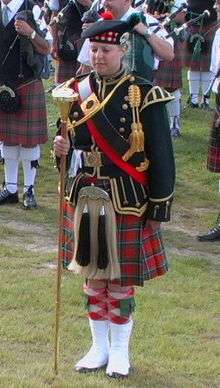Definify.com
Webster 1913 Edition
Mace
Mace
Mace
,Mace
,Webster 1828 Edition
Mace
MACE
,MACE
,Definition 2026
Mace
mace
mace
English


Noun
mace (plural maces)
- A heavy fighting club.
- 1786, The Mace is an ancient weapon, formerly much used by cavalry of all nations, and likewise by ecclesiastics, who in consequence of their tenures, frequently took the field, but were by a canon of the church forbidden to wield the sword. — Francis Grose, A Treatise on Ancient Armour and Weapons, page 51.
- A ceremonial form of this weapon.
- 1598, I am a king that find thee; and I know 'Tis not the balm, the sceptre, and the ball, The sword, the mace, the crown imperial, The intertissued robe of gold and pearl... — William Shakespeare, Henvry V, Act IV, Scene I, line 259.
- A long baton used by some drum majors to keep time and lead a marching band. If this baton is referred to as a mace, by convention it has a ceremonial often decorative head, which, if of metal, usually is hollow and sometimes intricately worked.
- An officer who carries a mace as an emblem of authority.
- (Can we find and add a quotation of Macaulay to this entry?)
- A knobbed mallet used by curriers in dressing leather to make it supple.
- (archaic) A billiard cue.
Translations
|
|
Verb
mace (third-person singular simple present maces, present participle macing, simple past and past participle maced)
- To hit someone or something with a mace.
See also
Etymology 2
Borrowing from Javanese [Term?] and Malay, meaning "a bean".
Noun
mace (plural maces)
- An old money of account in China equal to one tenth of a tael.
- An old weight of 57.98 grains.
- (Can we find and add a quotation of S. W. Williams to this entry?)
Etymology 3
From Middle English, from re-interpretation of macis as a plural (compare pea); ultimately from Latin maccis (name of an unidentified spice).
Noun
mace (plural maces)
- A spice obtained from the outer layer of the kernel of the fruit of the nutmeg.
- 1610, William Shakespeare, The Winter's Tale, Act IV, Scene III, line 45.
- I must have saffron to color the warden pies; mace; dates, none -- that's out of my note; nutmegs, seven; a race or two of ginger, but that I may beg; four pounds of prunes, and as many of raisins o' th' sun.
- 1610, William Shakespeare, The Winter's Tale, Act IV, Scene III, line 45.
Translations
Etymology 4
From the name of one brand of the spray, Mace.
Noun
mace (plural maces)
- Tear gas or pepper spray, especially for personal use.
Translations
|
|
Verb
mace (third-person singular simple present maces, present participle macing, simple past and past participle maced)
- To spray in defense or attack with mace (pepper spray or tear gas) using a hand-held device.
- (informal) To spray a similar noxious chemical in defense or attack using an available hand-held device such as an aerosol spray can.
- 1989, Carl Hiaasen, Skin Tight, Ballantine Books, New York, chapter 22:
- When Reynaldo and Willie had burst into Larkey's drug store to confront him, the old man had maced Willie square in the eyes with an aerosol can of spermicidal birth-control foam.
- 1989, Carl Hiaasen, Skin Tight, Ballantine Books, New York, chapter 22:
References
Anagrams
Albanian
Pronunciation
- IPA(key): /matsɛ/
Noun
mace f
Declension
This noun needs an inflection-table template.
Old French
Etymology 1
From Late Latin mattia or *mattea (cf. mateola), from Proto-Indo-European *mat (“hoe, plow”).
Noun
mace f (oblique plural maces, nominative singular mace, nominative plural maces)
- mace (weapon)
Descendants
Etymology 2
Ultimately from Latin maccis (name of an unidentified spice).
Noun
mace f (oblique plural maces, nominative singular mace, nominative plural maces)
- mace (spice)
References
- (fr) Godefroy, Frédéric, Dictionnaire de l'ancienne langue française et de tous ses dialectes du IXe au XVe siècle (1881) (mace, supplement)
- mace on the Anglo-Norman On-Line Hub
Spanish
Verb
mace
- Formal second-person singular (usted) imperative form of mazar.
- First-person singular (yo) present subjunctive form of mazar.
- Formal second-person singular (usted) present subjunctive form of mazar.
- Third-person singular (él, ella, also used with usted?) present subjunctive form of mazar.
Taraon
Pronunciation
- (Darang Deng) IPA(key): /mɑ³¹tɕi⁵³/
Etymology
Noun
mace
References
- Roger Blench, Mark Post, (De)classifying Arunachal languages: Reconstructing the evidence (2011) (as macey)
- Jatan Pulu, A Phrase Book on Taraon Language (1991) (as mace or in running text often macẽ)
- Huang Bufan (editor), Xu Shouchun, Chen Jiaying, Wan Huiyin, A Tibeto-Burman Lexicon (1992; Central Minorities University, Beijing)